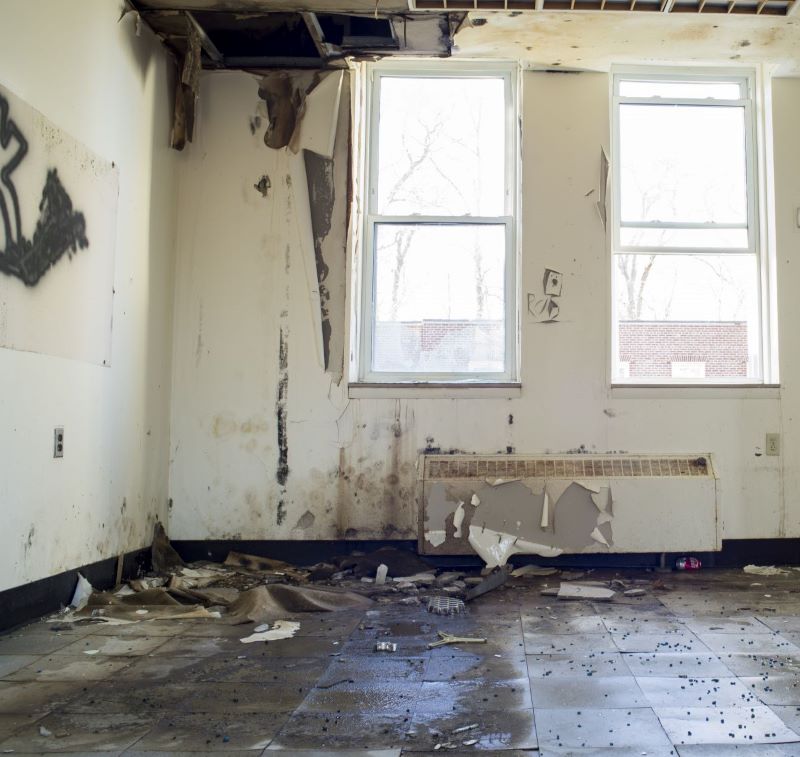Water Damage Mitigation
Regardless of its benefits, water can be a destructive element in your home. Excess water or moisture, for example, flooding, can cause structural damages and severe health complications. You need a water damage restoration company to help you mitigate any water damages.

Quick response time is mandatory for a successful water damage restoration, especially if your property requires restoration. There are many reasons why you will definitely need water damage mitigation or restoration services. You could have damaged plumbing or appliance, floods, wet basements, or excess water resulting from the firefighting efforts.
Failure to address your water damage as soon as possible can quickly escalate the damage situation. Excess water and water damage can cause electrical hazards, costly damage to your property and its contents, or lead to the growth of harmful mold and mildews.
Frequently Asked Questions
How is Water Damage Repaired?
The water damage restoration process is a little hectic. We use a few criteria to determine if your property can be restored or requires replacement. These include;
- Replacement costs vs. restoration costs
- Contamination degree
- Amount of property damage
Our quick, professional water damage restoration services can help you mitigate or avoid any possible mold situations. Mold is a hazardous effect of water damage and tends to cause health complications if not removed early.
What to Do When you Notice Water Damage?
The first thing to do when you notice water damage is to call for professional help. The sooner you call for professional help, the soon we help minimize the structural damage and bacteria growth that begins within hours.
As part of water mitigation, you can remove as much excess water as possible by blotting and mopping.
Remove any floor coverings temporarily attached. Leave the hard work to your professionals, who will be there in no time.
What to Expect from Our Water Damage Restoration Services?
Once we arrive at your property, we first assess the property to determine the water damage level. This helps us to determine how we will handle the restoration process. It also allows us to come up with a rough estimate that we can both work with.
Using specialized tools, such as sensors, probes, and moisture-detection meters, we can determine the extent of the water damage. We identify the source and degree of the water damage. We then create the most efficient water damage restoration plan to ensure we mitigate the issue as fast and efficiently as possible.
We will then begin the restoration process by salvaging what can be salvaged and clearing the surface as effectively as possible. If there is any construction to be done, we ensure it is done to restore your property to its original position.
After completing the restoration process, we do a final inspection to ensure all water fixtures are working and no resulting water damage.
Saved Restoration provides the best residential or commercial water damage, flood restoration, and water extraction services you can rely on.
Why Us
Our team of certified water damage restoration experts at Saved Restoration have the skills and relevant information necessary to mitigate crisis. We will work with you in a professional, clear, and results-oriented manner from mitigation, through restoration, to the last stages of the process.
Besides providing fire damage restoration services, we also come up with an honest estimate of the entire project. This information is relevant to our agreement and to the insurance company you are filing the claim.
We are available 24/7 to provide fire damage restoration services to residential, institutional, commercial, and industrial properties.
Water Damage Prevention Tips
Assess your water features regularly to ensure they are secure and functional, are in good condition, and are leak-free. These include your water tanks, ice makers, dishwashers, and refrigerators.
Ensure you clean your gutters every once in a while, mostly in autumn, to avoid leaks and backups. Moreover, keep your home heated while you traveled to prevent frozen pipes and potential flooding.
Finally, leave the cabinet doors closed, especially during freezing weather, to allow warm air to avoid pipes from freezing.
